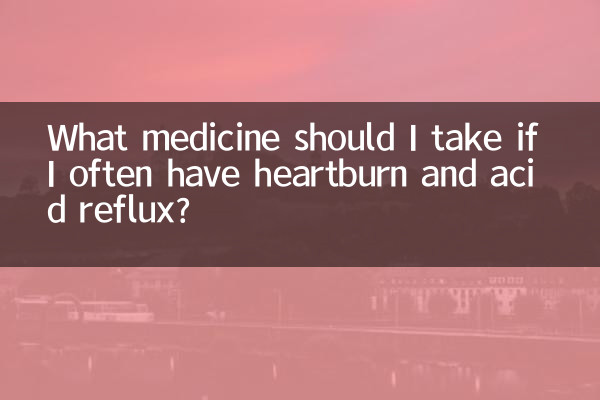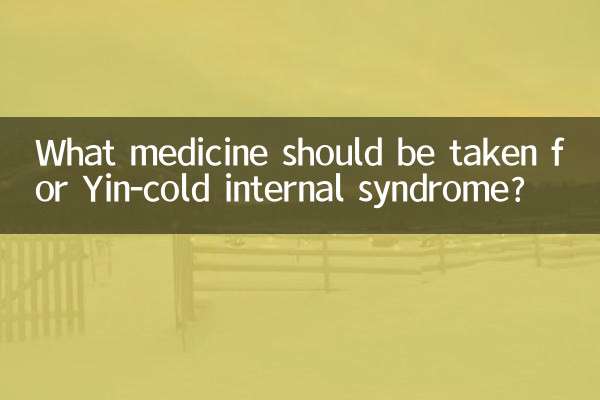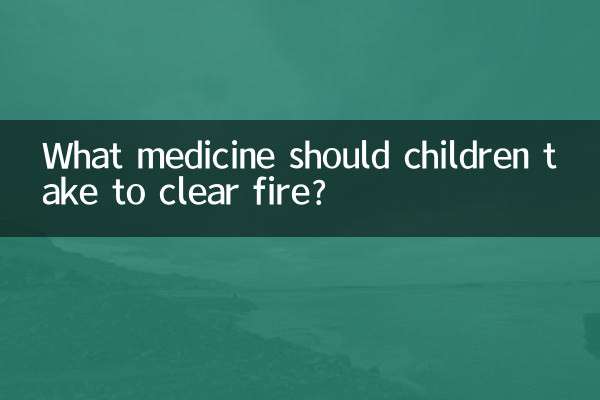What medicine should I take if I often have heartburn and acid reflux?
Heartburn and acid reflux are common digestive system problems for many people, especially modern people with irregular diet and high stress, which are more likely to cause hyperacidity or gastroesophageal reflux. To address this problem, choosing the right medication can effectively alleviate the symptoms. The following is a compilation of hot topics and hot content about heartburn and acid reflux in the past 10 days across the Internet, combined with medical advice to provide you with a detailed medication guide.
1. Common causes of heartburn and acid reflux

Heartburn and acid reflux are often caused by overproduction of stomach acid or gastroesophageal reflux (GERD). Common triggers include:
| inducement | Description |
|---|---|
| Improper diet | Spicy, greasy, high-fat, and acidic foods can easily stimulate gastric acid secretion |
| living habits | Overeating, lying down immediately after meals, smoking and drinking |
| Too much pressure | Long-term stress and anxiety will increase gastric acid secretion |
| drug side effects | Certain antibiotics and analgesics may irritate the gastric mucosa |
2. Commonly used drugs to treat heartburn and acid reflux
For heartburn and acid reflux, drugs are mainly divided into the following categories:
| drug type | Representative medicine | Mechanism of action | Applicable people |
|---|---|---|---|
| Antacids | Aluminum magnesium carbonate (Daxi), aluminum hydroxide | Neutralizes stomach acid and quickly relieves symptoms | Mild heartburn, occasional attacks |
| H2 receptor blockers | ranitidine, famotidine | Inhibit gastric acid secretion, the effect lasts for 6-12 hours | Moderate heartburn, acid reflux at night |
| Proton pump inhibitors (PPIs) | Omeprazole, lansoprazole | Strongly inhibits gastric acid secretion, the effect lasts for 24 hours | Severe heartburn, frequent attacks |
| Gastric mucosa protectant | Sucralfate, colloidal bismuth pectin | Protect gastric mucosa and reduce acid erosion damage | With stomach ulcer or gastritis |
3. Suggestions on drug selection
1.mild heartburn: Give priority to antacids, such as aluminum magnesium carbonate, which have quick effects and few side effects.
2.moderate heartburn: H2 receptor blockers are more suitable, especially for people with acid reflux at night.
3.Severe or frequent attacks: It is recommended to use PPI drugs, but follow doctor’s advice and avoid long-term use.
4.Accompanied by gastric mucosal damage: Can be used in combination with gastric mucosal protective agent to promote repair.
4. Precautions when taking medication
| Things to note | Specific content |
|---|---|
| Medication time | PPIs should be taken on an empty stomach (30 minutes before meals), and antacids should be taken 1 hour after meals. |
| drug interactions | PPI may affect the absorption of certain drugs (such as clopidogrel), please consult your doctor |
| Long-term medication risks | Long-term use of PPIs may increase the risk of osteoporosis and intestinal infection |
5. Suggestions on lifestyle adjustments
Medication needs to be combined with lifestyle adjustments to more effectively control heartburn and acid reflux:
1.diet: Avoid spicy, coffee, carbonated drinks and eat small meals frequently.
2.body position: Avoid lying on your back within 2 hours after a meal, and raise the head of the bed 15-20 cm when sleeping.
3.Decompress: Relieve stress through exercise, meditation, etc.
Summary
The choice of medication for heartburn and acid reflux depends on the severity of symptoms and individual circumstances. Mild symptoms can be quickly relieved with antacids. For moderate symptoms or above, it is recommended to use H2 receptor blockers or PPIs, and pay attention to lifestyle adjustments. If symptoms persist or worsen, you should seek medical attention promptly to check for gastroesophageal reflux disease (GERD) or other digestive tract diseases.

check the details

check the details